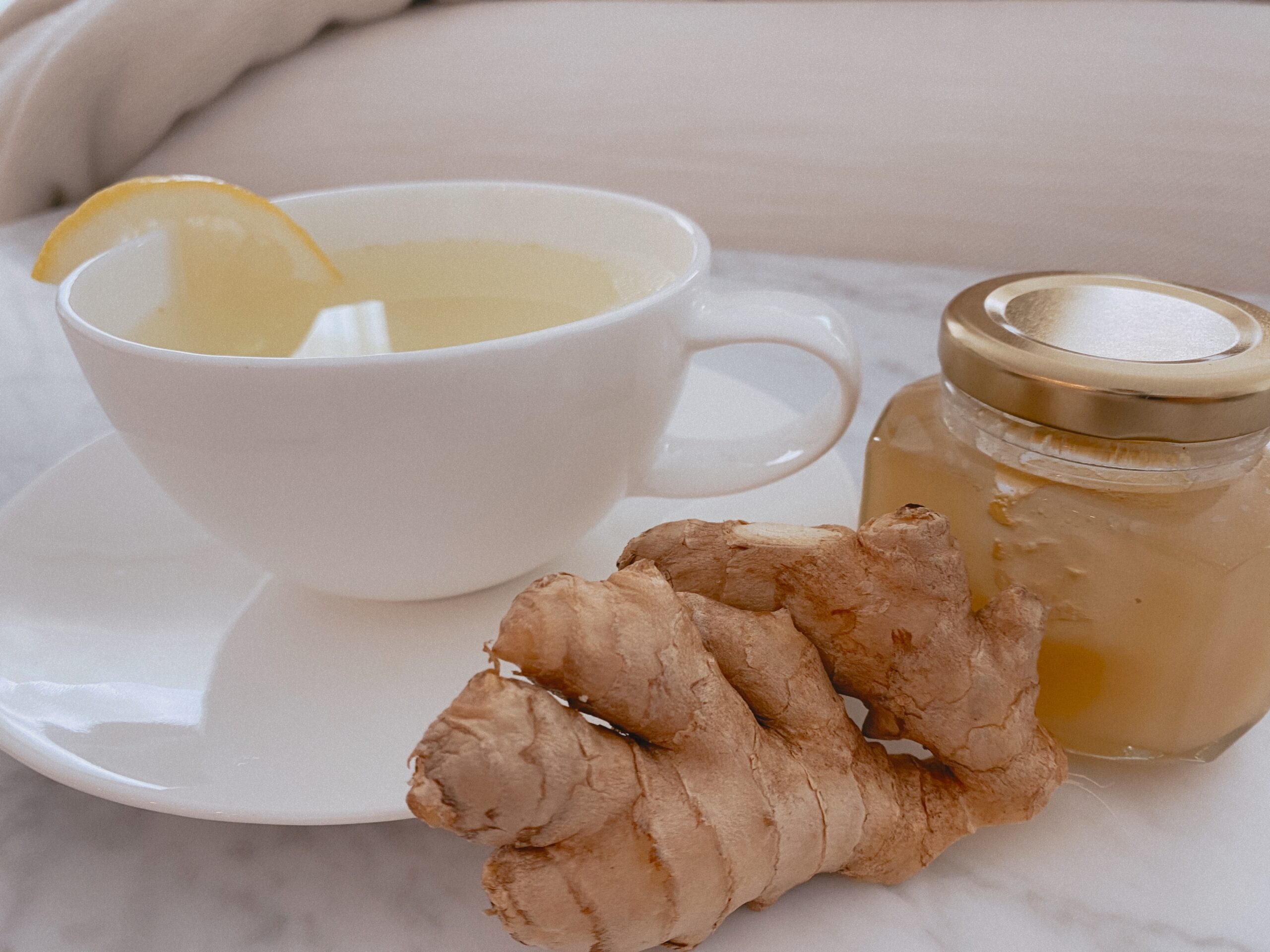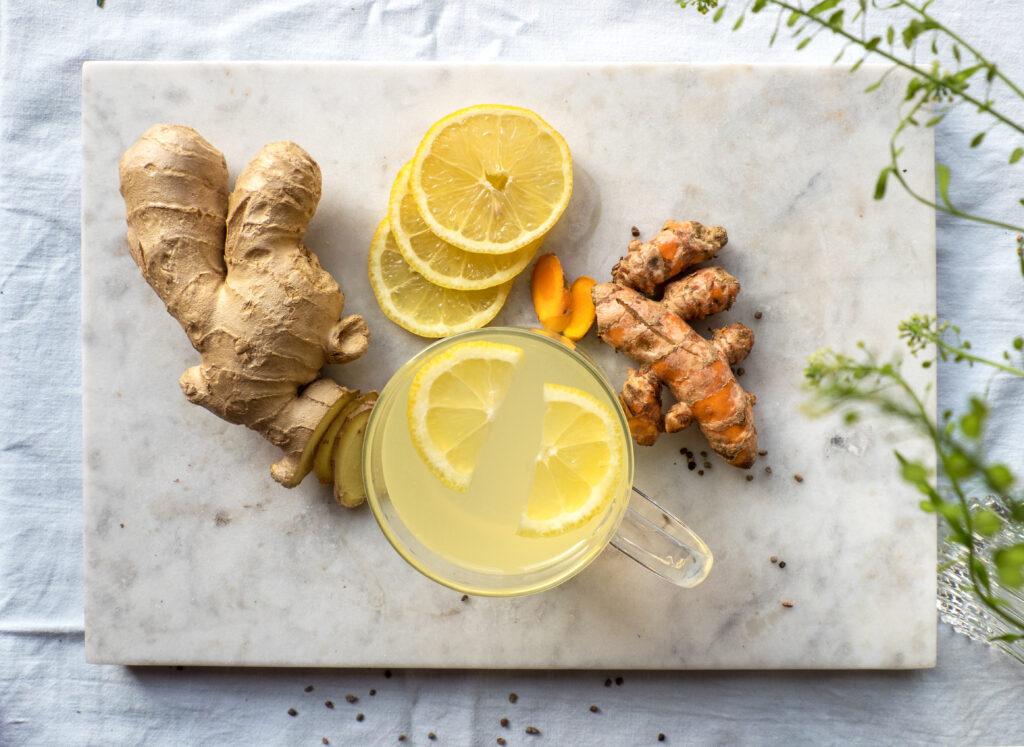
Extra Spicy Ginger Tea
There really isn’t any time that a cup of fresh ginger tea doesn’t sound good to me. Ginger has long been used in various ways in both traditional and alternative medicine. And for good reason!
This root has a very long list of health benefits that have been proven by the scientific community. Ginger is high in gingerol, a substance that has high antioxidants and anti-inflammatory properties. It is what gives ginger most of its medicinal qualities. Some of the reasons why I love ginger so much are as follows. It’s great for upset stomachs, fighting nausea, and aiding digestion. This makes it particularly useful for fighting morning sickness in pregnant women as well as helpful in alleviating period pain. Ginger has also been used to help treat chronic indigestion.
Another study found that ginger was very useful in significantly reducing joint pain and stiffness caused by osteoarthritis. Since I already deal with this pain in my knees and fingers, I have found ginger tea to be helpful in managing this pain, especially in the winter months.
Another useful trait of ginger is its ability to fight harmful bacteria and viruses. It soothes a sore throat and helps fight the common cold and the flu.
Now that you know why I love ginger so much, here is my favorite ginger tea recipe I make at home. If you’re anything like me and love the extra spicy kick of ginger, then I’m sure you’ll love this tea too!
Extra Spicy Ginger Tea
Ingredients
- a large chunk of fresh ginger root
- water
- lemon
- honey
- cayenne pepper
Directions
I never use exact proportions when making this. I kinda just go with what I’m in the mood for and eye it. So here are the basics; you can adjust to what you like.
- Start by peeling a large piece of ginger. The skin on ginger is super thin, so I use my smallest knife. Peeling ginger with a spoon also works well. After the ginger is peeled, chop the ginger into large slices.
- Add the ginger slices to the blender and add enough water to cover the blades. Then blend until you have a fine pulp.
- Bring a large cup of water to a boil and remove from heat.
- Add the ginger pulp to the boiling water and pour in the freshly squeezed lemon juice. I will usually use half a lemon per cup of tea. Pour the tea into your favorite mug and sweeten it with a lot of honey or maple syrup.
- If you’re feeling sick or like the extra heat, add a dash of cayenne.
I used to add the cayenne all the time, but I no longer use it after I found out about my nightshade allergy.

Best Time To Drink Ginger Tea
A hot cup of ginger tea is great at any time of the day to improve your health and boost your immune system. But if you’re looking for specific benefits, understanding the ideal time to enjoy your ginger tea can increase its potential nutritional benefits.
Drinking ginger tea between meals has been shown to reduce swelling and inflammation associated with arthritis. And although many believe that the best time for ginger tea is after a meal, research suggests that drinking a cup of spiced ginger tea before a meal is better. Consuming a cup of ginger tea 30 minutes before eating has been shown to reduce acid reflux and improve the quality of digestive enzymes. This allows the body to absorb more nutrients from the meal and helps with digestion.
And lastly, some people prefer to have their tea before bed to soothe indigestion, help with nausea, reduce nasal congestion, and help with constipation.
Does Ginger Tea Have Caffeine?
Ginger tea is naturally caffeine-free, so there’s no need to worry about it interfering with your sleep if you drink it before bedtime. Although ginger doesn’t contain any sleep-inducing properties, there are other ways that it can help you sleep better.
Drinking a cup of tea at night is a great time to relax and practice mindfulness. The anti-inflammatory properties can help reduce pain, making it easier for you to get comfortable. And a warm cup of tea and help you get cozy enough to doze off.
If you’re looking for more ways to add fresh ginger to your diet, check out my Best Fresh Juice Recipes. Not only are they all healthy and delicious, but they include plenty of ginger.
The many benefits of ginger tea are clear.
In conclusion, ginger tea is a powerful and delicious health beverage that is packed with benefits. People looking for a boost in their overall health, digestion, and immunity should consider adding this tea to their daily routine. Whether you drink it to help you relax, reduce pain, or simply because you enjoy the taste, one thing is for sure: ginger tea is an easy and effective way to improve the well-being of you and your whole family. Research has even shown that regular consumption of ginger tea can lead to reduced inflammation and risk of chronic diseases.
You can also learn more about the Best Foods For Autoimmune Disease and the Worst Foods For Autoimmune Disease here. Here’s to working on our health, one day at a time; let’s raise a cup of ginger tea to a healthier and happier you!
Give it a try, and let me know what you think!
Xx Monti
Shop the Post


